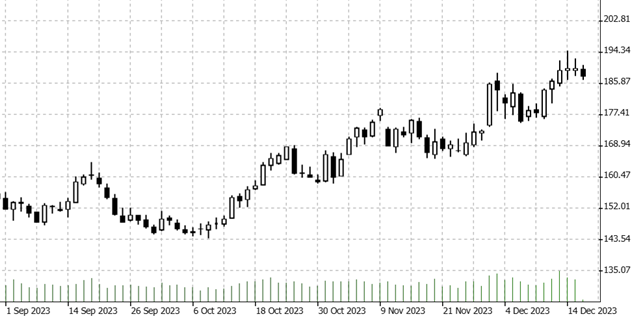

Source: Bernstein Bank GmbH
19.12.2023 – Shadow boxing in Tokyo: instead of finally getting into the ring, the Bank of Japan continues to warm up. In other words: once again, the monetary authorities have not raised interest rates. Nor have they sent out any signals that the fight is about to begin. The audience leaves the hall disappointed.
That’s not going to happen with the firm yen: Buyers in the forex market turned away. Here’s a look at the Canadian dollar, which rallied nicely. You can see CADJPY in the hourly chart and you can put any other major currency against the Japanese soft currency – the trend is always the same.

Source: Bernstein Bank GmbH
That’s what happened: Nothing. There was no rate hike – the BoJ left the key interest rate at minus 0.1 per cent and the yield target for ten-year government bonds at around zero per cent. The accepted upper yield band for Japanese bonds remains at 1.0 per cent. The decision was unanimous, with the central bank council pointing to the recent weakening of inflation in the Nippon.
Silence in Tokyo
While the fact of the interest rate move had been widely expected, some forex traders were disgruntled that the press conference made no verbal reference to an imminent end to the ultra-loose monetary policy.
Reuters had analysed this about a week ago: After more than 16 years since the last rate hike, Governor Kazuo Ueda would have to find cautious words so as not to spook the hyper-sensitive foreign exchange market. After all, he has already caught the market on the wrong foot twice – the yen has pulled away. Ueda must also prepare the forex market very carefully for a coming policy change in order to prevent a destabilisation of the bond market.
Definitely in spring
As a result, the central bank today remained unemotional in its dithering and hesitation: “There are extremely high uncertainties with regard to the Japanese economy and prices,” explained central bank chief Kazuo Ueda to journalists. More clarity is needed as to whether wage-driven inflation is sustainable. A few weeks ago, traders had registered completely different signals, as we reported.
According to Reuters, 80 per cent of market participants see a policy change by April. The market is now hoping for a revision of monetary policy in the first quarter of next year, commented Hirofumi Suzuki, chief foreign exchange strategist at SMBC in Tokyo. If you want to be in on the hope, you should keep an eye on the yen. Whether long or short – Bernstein Bank wishes you successful trades and investments!
_____________________________________________________________________________________________________________________________
The content of this publication is for general information purposes only. In this context, it is neither an individual investment recommendation or advice nor an offer to purchase or sell securities or other financial products. The content in question and all the information contained therein do not in any way replace individual investor- or investment-oriented advice. No reliable forecast or indication for the future is possible with respect to any presentation or information on the present or past performance of the relevant underlying assets. All information and data presented in this publication are based on reliable sources. However, Bernstein Bank does not guarantee that the information and data contained in this publication is up-to-date, correct and complete. Securities traded on the financial markets are subject to price fluctuations. A contract for difference (CFD) is also a financial instrument with leverage effect. Against this backdrop, CFD trading involves a high risk up to the point of total loss and may not be suitable for all investors. Therefore, make sure that you have fully understood all the correlating risks. If necessary, ask for independent advice. CFDs are complex instruments and are associated with the high risk of losing money quickly because of the leverage effect. 68% of retail investor accounts lose money trading CFD with this provider. You should consider whether you understand how CFD work and whether you can afford to take the high risk of losing your money.7
